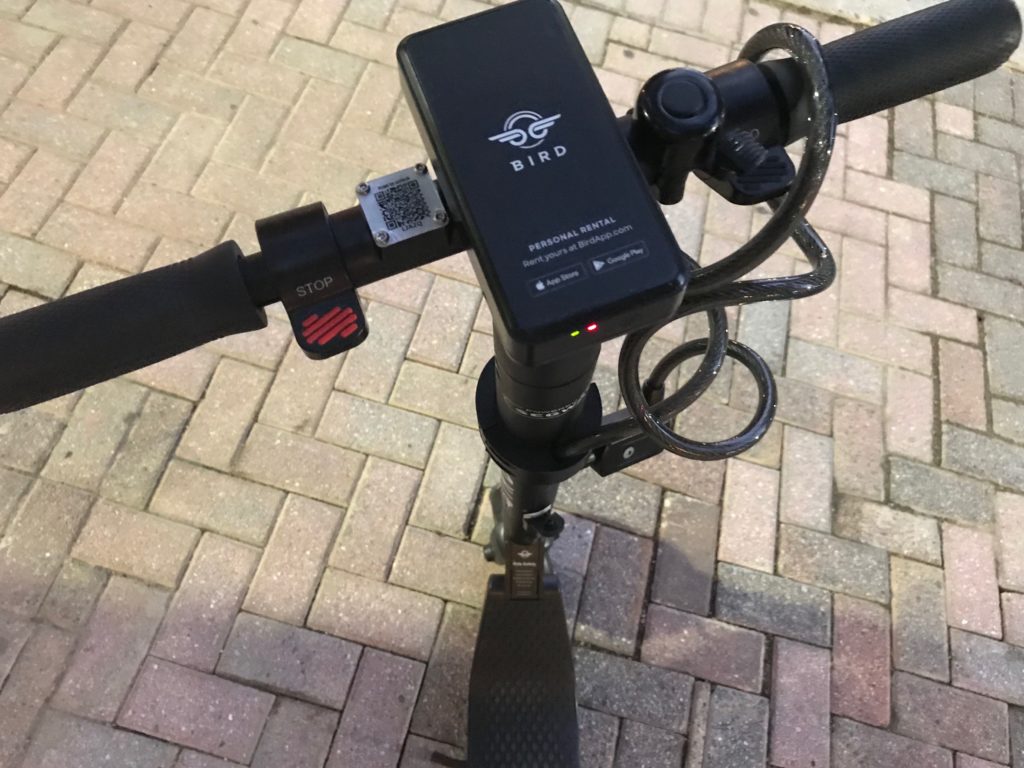Arlington may soon be making electric scooters a more or less permanent fixture of the county’s streets and sidewalks.
The County Board will vote on an ordinance change during its meeting this Saturday, November 16 to allow e-scooter companies to operate in Arlington — provided companies fulfill the requirements of a new permitting system starting next year.
The code change would make the pilot program for “micro-mobility devices” a permanent part of Arlington’s transit system after officials originally approved a nine-month pilot program in September 2018 — and extended it ever since.
If Board members approve the proposed code changes on Saturday, it would allow scooter companies in Arlington to continue operating as long as they fulfill the requirements of the new permit application and pay the still-to-be-determined application fees by January 1, 2020. Much like the pilot program, the County Manager’s office would also be allow to cap the number of devices permitted per company, demand equitable deployment, and levy penalties.
The program will also specify some “community and information sharing requirement” according to a staff report to the Board — a similar requirement to the one in Los Angeles that Uber refused to fulfill, and which led city officials to rescind the company’s permits over Uber’s objections.
But moving forward on the scooter program in Arlington isn’t a surprise considering a recent Mobility Lab report encouraging county leaders to make the scooter program permanent.
The recent report drew support from bicycle and pedestrian advocates, and also recommended that the county roll out some changes next year, including:
- Adding more safe infrastructure like protected bike lanes for scooters and cyclists, as outlined in the county’s recently updated Master Transportation Plan.
- Addressing parking complaints by creating a map of approved parking spots as well as “no-go” areas.
- Eliminating barriers to lower-income users by waiving company’s requirements that users need credit cards
Users traveled just over 400,000 miles on scooters in Arlington between Oct. 2018 and June 2019, per a staff report, but some crashes and blocked sidewalks have prompted discussions about age restrictions and designated parking spaces as well as allowing scooters on some trails.
“Staff proposes that it be permissible to use County sidewalks (with limitations), trails, and on-street bicycle facilities for micro-mobility travel, unless specifically signed/marked otherwise,” wrote county staff in a report to the Board for Saturday’s meeting. “One of the first steps in implementation of the new ordinance would be to sign/mark as prohibited for riding those key sidewalk conflict areas identified during the Pilot program.”
The question of whether scooter riders should be allowed on sidewalks has been a topic of debate among some local groups. Staff is recommending allowing sidewalk use in areas of the county where bike lanes are not a viable option.
“Key stakeholder groups including the Pedestrian Advisory Committee, Bicycle Advisory Committee, and Commission on Aging expressed concern that irresponsible sidewalk-riding could be a danger to pedestrians of any age, however they also expressed support for allowing responsible sidewalk-riding where it was not inconsistent with volumes of pedestrians using the facility, and where safe in-road options are not present,” the staff report says.
The Commission on Aging also expressed concerns that “scooter parking would create an obstruction to safe pedestrian circulation, especially near public transit stops and stations.” County staff seeks to address those concerns with restrictions that specify that scooters should be parked upright and off to the side on sidewalks, if not in a designated scooter dock.
Earlier this year, lawmakers in Richmond passed legislation requiring localities to create their own regulations for where users could ride, and park, the devices.
The new ordinance would not, however, preclude future changes to the scooter program.
“Staff commits to a review of the program and consideration of potential refinements to the ordinance at or about one year after ordinance changes go into effect,” a county staff report states.



